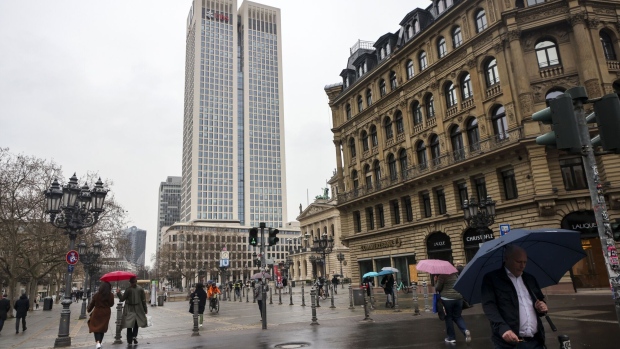May 2, 2023
ECB Says Euro-Area Banks Curbed Credit by More Than Expected
, Bloomberg News

(Bloomberg) -- Banks in the euro zone curbed lending more than anticipated after borrowing costs jumped and turmoil gripped the financial sector, reinforcing calls for the European Central Bank to slow the pace of its interest-rate hikes.
Credit standards “tightened further substantially” in the first quarter, according to the ECB’s Bank Lending Survey, published Tuesday. “The tightening for loans to firms and for house purchase was stronger than banks had expected in the previous quarter and points to a persistent weakening of loan dynamics.”
The decline in net demand from firms was more than foreseen by banks in the previous three months, and the most since the global financial crisis, it said.
Separately, figures showed growth in M3 — a broad measure of the money circulating in the economy — eased in March and was the slowest since October 2014. The expansion in lending to households and businesses also weakened.
German bonds trimmed their decline after the reports were released, with the 10-year yield 4 basis points higher at 2.35% compared to 2.42% earlier, while money markets maintained 20% odds on a half-point hike on Thursday.
The poll is the first to offer concrete indications of the knock-on effects of Silicon Valley Bank’s March demise and Credit Suisse Group AG’s takeover by UBS Group AG later on.
What Bloomberg Economics Says...
“The results of the ECB bank lending survey should help the members of the Governing Council who would like to downshift the pace of tightening to 25 basis points from 50 bps at this week’s meeting. The report suggests the demand for and the supply of credit continue to dry up.”
—David Powell, senior economist. For full react, click here
ECB officials had suggested that evidence of a tightening in financial conditions from the banking stress could persuade them to raise rates by a smaller amount at their next decision on Thursday, when the Governing Council is expected to choose between a quarter- or a half-point move.
The tighter lending conditions were driven by banks’ perception and tolerance of risks, while the ECB’s rate increases also played a role, the report said. Banks expect “a further, though more moderate” tightening in the second quarter.
In a sign that the tensions in the financial sector in March are having an impact on the industry in the euro area, respondents in the survey reported that their “access to retail and wholesale funding deteriorated,” the ECB said.
“For money markets and debt securities, the deterioration reverses the improvement in the access to these markets registered at the end of last year, possibly reflecting the March 2023 market turmoil, the lower overall level of excess liquidity and the increased collateral availability that had stemmed from TLTRO III voluntary early repayments in the last quarter of 2022,” it said.
The backdrop for this week’s ECB’s meeting will become more complete at 11 a.m., when Eurostat releases April inflation figures for the 20-nation euro area. Core inflation — currently the preferred measure for policymakers — is expected to ease slightly while the headline number holds steady.
Data on economic growth on Friday pointed to an uneven trajectory in the currency bloc. While it avoided an energy-induced winter recession as France and Italy returned to growth and Spain gathered momentum, Germany only narrowly dodged a downturn with first-quarter stagnation.
Business surveys by S&P Global showed the economy expanding at a faster clip at the beginning of the second quarter, even as the development was solely driven by the services sector. Some officials may take such robust demand as a sign that rate hikes must continue to return inflation to the 2% goal.
--With assistance from Jana Randow and James Hirai.
(Updates with BE after sixth paragraph)
©2023 Bloomberg L.P.






